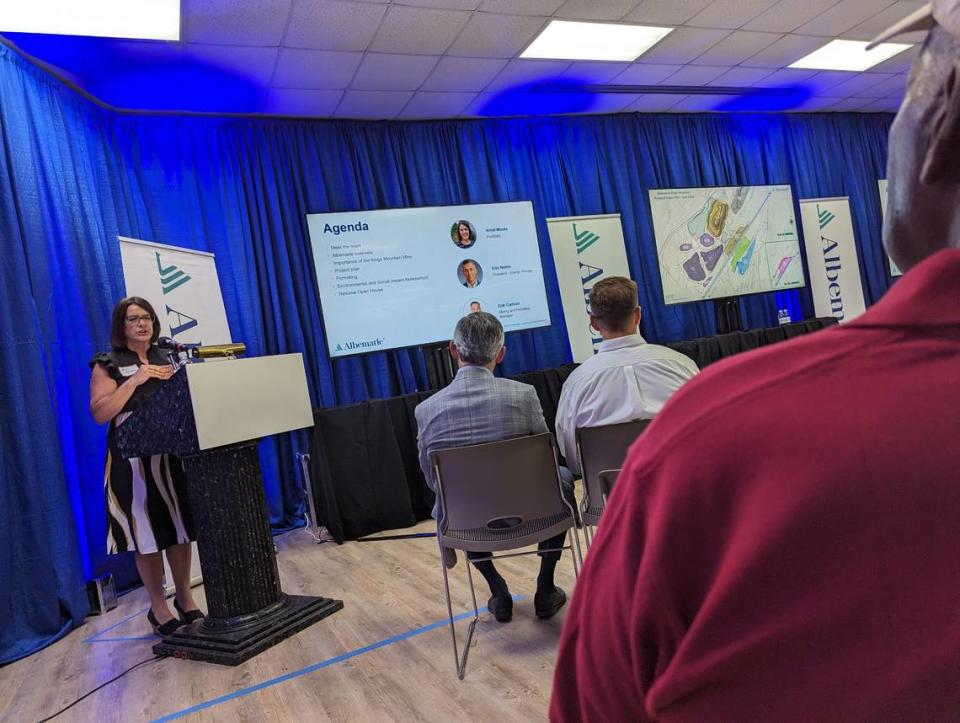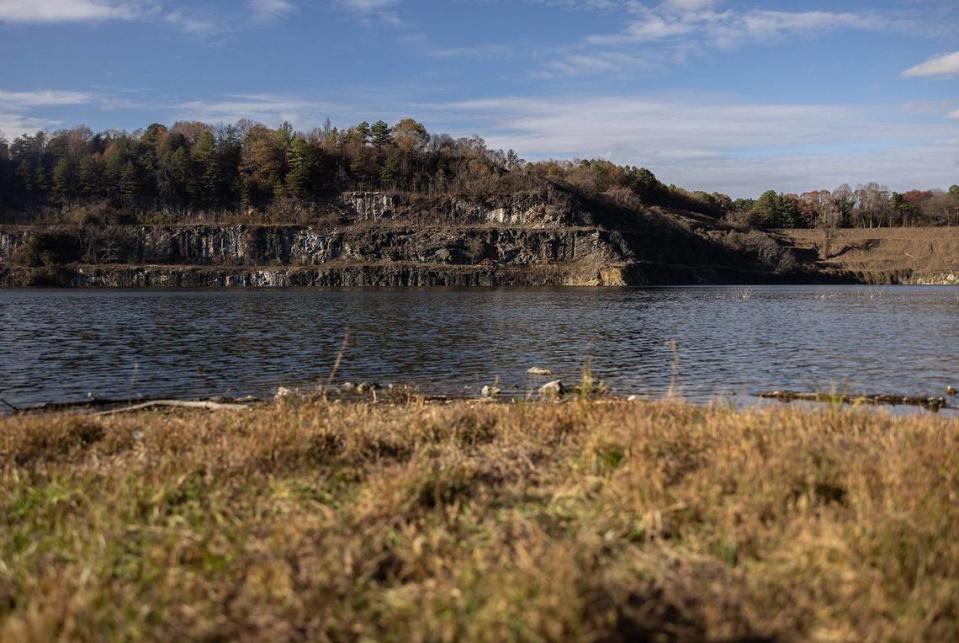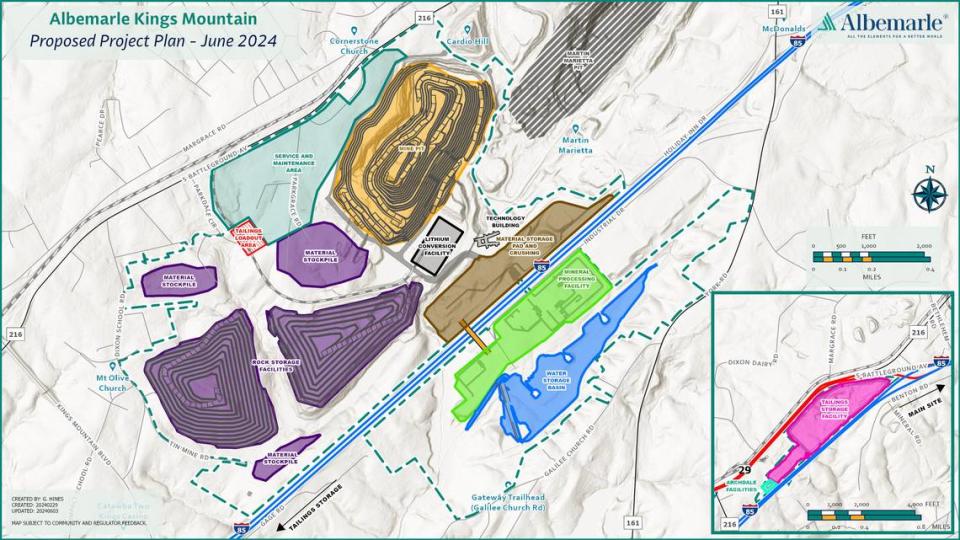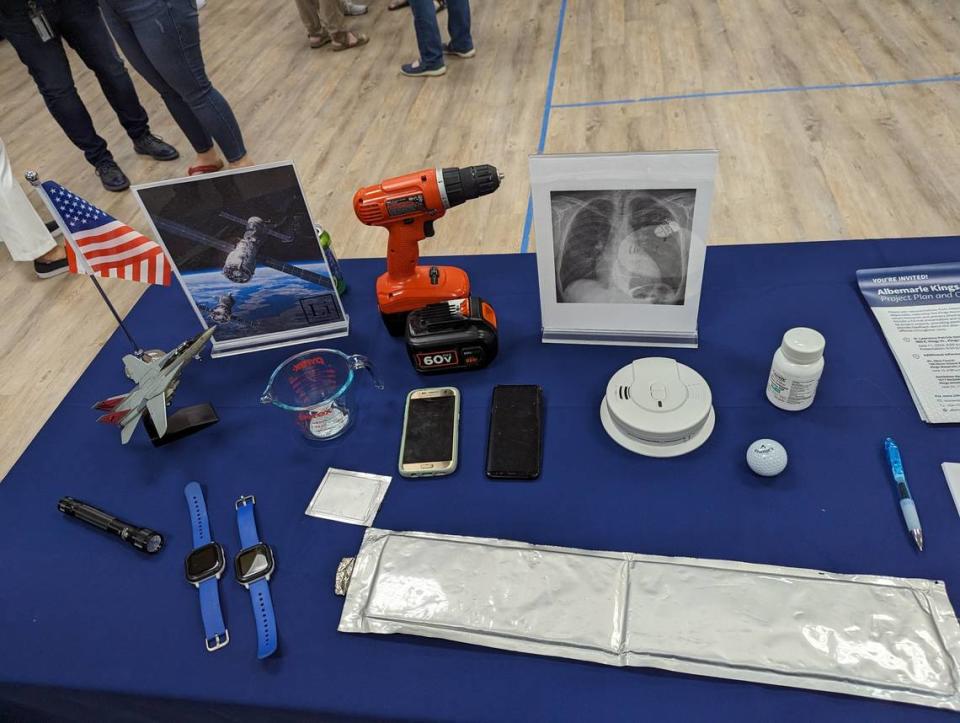As Albemarle Corp. released what its proposed Kings Mountain lithium mine project site plan will look like, about 70 residents turned out to ask questions that boiled down to one main point: how will the town benefit?
For the first time, the public can see the layout of the proposed project with material stockpiles, rock storage facilities, mineral processing facility and a water storage basin between South Battleground Avenue to the north, Dixon School Road to the left and south along Interstate 85.
On Tuesday, Albemarle unveiled its site plan for the nearly 1,200-acre Kings Mountain lithium mine in Cleveland County, about 30 miles west of Charlotte.
The company has not said how much the massive project will cost, but projects like this can cost hundreds of millions of dollars.
Jonathan Bolt, who lives less than a mile from where Albemarle plans to reopen a dormant lithium mine, wanted to know the impact on the community along with the timeline of the company’s plan.
“I just want to understand what they’re doing and how they’re doing it,” Bolt said during a community meeting Tuesday night in Kings Mountain. “They’ve bought up property we all grew up with — the furniture store, the church and now the drive-in. They’re taking over the town. How do we benefit?”
This was the first of five open houses planned this month by the world’s largest lithium mining company, which is based in Charlotte.
The sessions also include a presentation and information stations where residents can ask questions of geologists, mining engineers, environmentalists and biologists.
About the lithium mine
In April, the state Department of Environmental Quality’s Division of Energy, Mineral, and Land Resources approved Piedmont Lithium’s mining permit for a new lithium mine in Gaston County.
Lithium is used in batteries to power electric vehicles, bikes and personal electronic devices.
North Carolina has been focused on the emerging clean energy economy and attracting businesses like lithium battery parts manufacturer Green New Energy Materials Inc. It’s part of a strategy to reduce state greenhouse gas emissions and deal with the impacts of climate change.
“Lithium is a crucial building block in the energy transition to clean energy and sustainable transportation,” said Eric Norris, president of energy storage for Albemarle. “I’m certain all of you literally have your hand around some form of lithium, whether it’s a steering wheel, a cell phone, a power tool every day of the week.”
Only 2% of the world’s lithium is available in the U.S., Norris said. And North Carolina is among a few places in the world where lithium mining is possible.
Large green areas in white pegmatite rock called spodumene are extracted to make lithium. Albemarle’s lithium mine is expected to produce about 420,000 tons of lithium-bearing spodumene concentrate per year.
Albemarle wants to construct the mine in a way the community wants, said Erik Carlson, mining and permitting manager for Albemarle. Along with meetings this month and mine site tours, there will be plenty of opportunity for public input, he said.

Albemarle’s lithium project permits
Albemarle plans to submit its Kings Mountain application for a state mining permit by the end of this year.
The permit process is expected to take two years, followed by another two-an-a-half years to build the mine,according to Albemarle.
There are over a dozen permits that need approval at the federal, state and local levels, Carlson said. Albemarle plans to begin applying for permits this summer and into September, he said.


Albemarle’s lithium site details
Albemarle’s plan shows the existing, 2,300-foot mine pit will be extended southwest by 900 feet. The company also will go deeper in the pit from its existing deepest point at about 265 feet to about 715 feet.
Along with the rock mine pit, which has filled with rainwater over the last 40 years, the Albemarle site includes a conversion facility, rock storage facilities, three material stockpiles, crushing facility, a material storage pad and a service and maintenance area.
Albemarle also will build a covered conveyor bridge across I-85 that will include a mineral processing plant and storage basin on the southern side of the highway. The project is financed by Albemarle using NCDOT-approved contractors.
A separate storage facility for tailings, the byproduct from separating minerals from rock, will be 3 miles away off I-85. The 144-acre site is a former mica mine called Archdale.
In 2015, Albemarle acquired Rockwood Holdings and its Kings Mountain site, which ceased operations in the late 1980s. About 65% of Albemarle’s site is “brownfield,” which means it was previously used for mining, Carlson said.
“We’re not impacting the native vegetation very much with this project,” Carlson said. The mining site will be surrounded by a 50-foot wide buffer to reduce noise, dust and lights outside of the mine.


Albemarle’s lithium mine operations
Dewatering of the dormant mine pit began in April and will take about 18 months, said Albemarle geochemist Morgan Warren. So far, about 178 million gallons has been discharged into Kings Creek and the pit water level is down about 9 feet.
“Every drop of water that leaves the pit goes into a temporary water treatment plant that we built on the edge of the pit,” he said.
After the pit is dewatered, Albemarle will blast the bedrock. Electronic blasting will be highly controlled, with several smaller covered blasting in close sequence to decrease noise and and dust, Carlson said.
There will be no blasting on weekends, at night or on holidays. Blasting will happen around the noon hour two to five times a week, Carlson said.
Trucks will be loaded with three types of material and moved to three locations. Non-ore-bearing rock will be stored in stockpiles on site. Ore-bearing rock will be trucked to the processing plant.
Limestone rock that can be turned into aggregate for construction will go to neighbor Martin Marietta Material. Albemarle plans to transfer the royalty fees to nonprofits in Kings Mountain and the surrounding communities, The Charlotte Observer previously reported.


When mining operations end
Albemarle’s initial permit request for the mine would allow for 10 years of operation.
Following mining, there will be up to five years of reclamation, Carlson said. Reclamation is the process of repairing or replacing damaged land.
The three stockpiles of unused rock materials on site are temporary and will be used during reclamation.
The rock storage facility will be 385 feet tall, about 200 feet higher than the gravel trail known as Cardio Hill overlooking the mine pit. And it will be permanent. “It’ll end up being a forested hill, similar to what you see on Cardio Hill today,” Carlson said.
Albemarle also has plans for workforce transition to provide employees with additional education and training after the mining ends. Albemarle has about 300 employees working in Kings Mountain now and expects to have about 1,000 during peak operations, Albemarle spokesman Ryan Dean said.
Area residents like Shirley Brutko, founder and head of the popular Kings Mountain hiking and biking trail that includes over 4 miles on Albemarle’s planned mining site, said part of the trail will be rerouted. And she’s satisfied with how the company is educating the community.
“We know we can ask questions. They’re giving to the community to make it a happier, healthier place to live,” Brutko said.
More community meetings
The next information meetings are:
▪ 9-11 a.m. June 15 at Mt. Olive Baptist Church, 146 Dixon School Road
▪ 5:30-7:30 p.m. June 18 at Mt. Zion Baptist Church, 220 N. Watterson St.
▪ 11 am.-1 p.m. June 25 at Bethlehem Baptist Church, 1017 Bethlehem Road
▪ 10 a.m.-noon June 27 at Mauney Memorial Library community room, 100 S. Piedmont Ave.
Source Agencies

